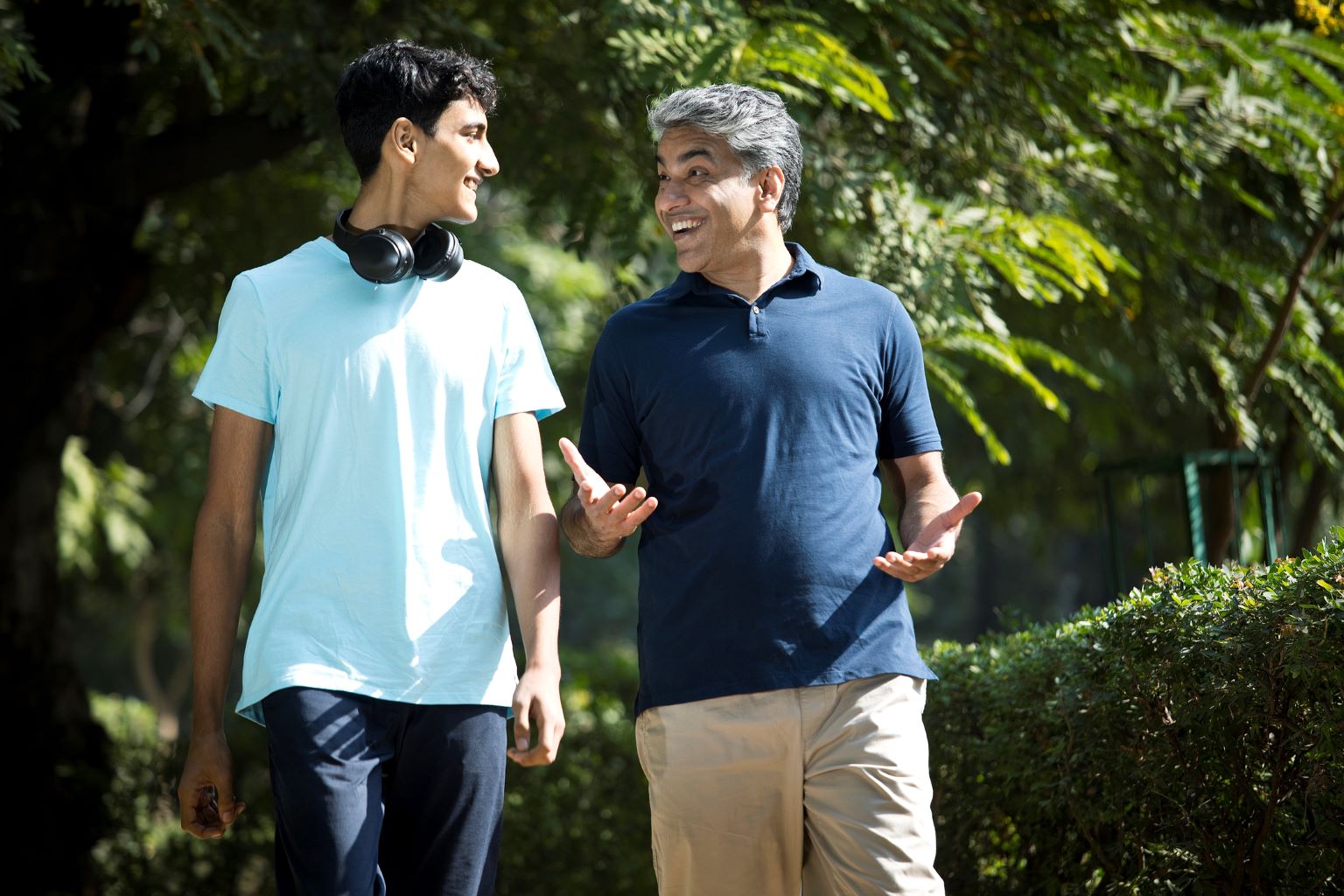BRANDED CONTENT
Better tutors, better schools, better everything: Do parents’ all-out efforts help teens thrive?
From gap years to gig work, youths are challenging the traditional definition of success, clashing with parents' expectations. Counsellors and social workers share insights into the minds and hearts of teenagers to help bridge that disconnect

As some youth opt for unconventional life choices, such as taking a gap year before university, a rift can form with their parents who may prioritise traditional pathways. PHOTO: GETTY IMAGES
The young man sitting in front of his counsellor was suffering from chronic anxiety, crushed under the weight of expectations. Another teenager did not leave home for a year because she “kind of gave up on her life”. A top student started getting into trouble in Secondary Three to test his parents’ limits.
Then there are cases of young people loitering at basketball courts and outside shopping malls late into the night, not wanting to return home. It is also not uncommon to hear of 18-year-olds barely staying awake in class, trying their very best to juggle a jam-packed schedule balancing school, CCAs, tuition, socialising with friends and other commitments.
When young people from different backgrounds opened up to youth social workers and counsellors, the latter found a common thread in their stories.
“The struggles and the questions the young people have about life are similar,” says Ms Kristine Lam, head of Youth Services at non-profit organisation Care Corner Singapore Ltd.
“They are at a growing up phase where they are trying to make sense of who they are and where they are heading towards in life, which makes them feel vulnerable and anxious,” explains Ms Lam, a social worker who has 12 years of experience working with families.
It is natural for 18 to 22-year-olds to feel anxious as they navigate one of life’s major transitions, into a young adult.
“What is important in terms of parenting is to help your child transit to the different social roles he or she is now expected to perform,” she explains.
Rewriting traditional script for success
Anecdotally, a growing number of Singapore’s youth is increasingly choosing educational paths that diverge from their parents' traditional aspirations. For example, taking a gap year before university or opting for short-term gig jobs instead of a full-time job. Some are also steering away from degrees which may be held in high regard by their parents, such as law or medicine.
“More and more young people these days are looking beyond just the paycheck. They are looking for more grounded work that allows them to make positive social or environmental impact and gives them a sense of fulfilment,” says Ms Sharmain Chin, founder of Total Wellness Initiative Singapore. The social enterprise has been conducting mental wellness workshops for secondary schools, polytechnics, ITEs (Institute of Technical Education) and universities since 2021.
On how her generation measures success, 19-year-old Dayna Yeo says: “We generally define success as being content with our lives and being able to provide for ourselves and our future families. I believe that a sense of fulfilment is one of the main determinants of success in my generation.”

For her and her peers, the future holds immense promise and is yet daunting.
“I think one of the main stressors for youths like me who are waiting to enter university would be uncertainty of the future,” says the aspiring psychologist who is entering university in July 2024.
As more young people seek out unconventional pathways to live their life or redefine what success means to them, this can lead to a rift between them and their parents who worry that their children “would not live well”.
“Asian parents often define success in terms of being in professions that are stable and earn good money,” said Ms Wong.
Managing parental expectations
Ms Ning Wong, an associate counsellor at Focus on the Family Singapore with 16 years of experience in family life education, coaching and counselling, highlights a familiar pattern, particularly among well-resourced families. “The parents themselves achieved great success in their careers and invested a lot of money in all sorts of enrichment classes for their children,” says the mother of two grown-up sons, aged 25 and 27.
“When the children did not perform up to expectations in school, the parents were quick to problem-solve with ‘better tutors, better schools, better everything’.”
While parents are naturally concerned about their children’s future, social workers say parents sometimes turn to asserting control when they do not know how to influence their children positively. And the outcome can be heartbreaking.
James (not his real name) had been doing well in school until he hit middle adolescence at 15. “After moving into Secondary Three, he started to rebel and spiral downwards because he felt he could never live up to his parents’ standards. His parents are both high fliers,” Ms Lam says.
If James was acting out his frustration, Kelly (not her real name) chose to retreat into her shell when she was 15. For nearly a year in 2019, she did not leave her room, except to use the toilet.
Kelly told social workers she had problems communicating with her mother. “Everything I told her, like it made me feel like it’s my fault instead. I think gradually I just didn’t tell her anything.”
Social workers say the fight for autonomy is strongest between the age of 14 and 16. That is usually the stage where parents find a sudden change in their child's temperament, or that they become more distant and harder to understand.
“If the parent-child relationship is strained during this phase, parents may face difficulty even having a cordial conversation as the child gets older,” says Ms Lam.
Fight-or-flight response
Adolescents may also experience heightened fight-or-flight type emotions and are susceptible to stress and anxiety. As they try to gain more independence, they will push the boundaries and renegotiate the rules or norms, hence leading to more arguments with their parents.
Poor communication is a major obstacle to finding mutual understanding between parents and children.
Ms Wong, who specialises in parent-child therapy, says: “Most of the time, children know what parents think but parents don’t know their children's thoughts.”

Through her interactions with teenagers and young adults, Ms Chin learns that even though friends are important during adolescence, what youth care about the most is what their parents think.
“When parents don’t care, the kids wonder why their parents don’t care about them. A lot of them wonder why their parents never ask them about their day, but care only about their grades. They feel their parents are not interested in their lives at all,” she says.
Ms Chin urges parents to make the first move to start a conversation with their teen.
Counsellors stress that it is important for parents to manage their own emotions so they can create a safe and judgement-free environment for communication. “Never pit yourself against the child,” Ms Lam cautions.
When asked why he kept getting into trouble, James told social workers it was his way of challenging his mother’s authority. “He said his mum had everything planned out for him since he was young, so he wanted to see if she would be able to bail him out each time he got into trouble,” says Ms Lam.
While showing care for children is important, research has shown that excessive parental control during adolescence could affect their self esteem, and prevent them from picking up critical life skills beyond being book smart. They include critical thinking and socio-emotional skills.
“During their growing up years, children need to be able to explore things to develop their own identity and confidence. They learn through life experiences. As parents, we all have this desire to protect our offspring and to shelter them from life’s negative experiences. But is that what our children truly need?
“As parents, we must resist the urge to short-circuit our child’s learning process. If we try to remove all possible pitfalls and failures, we are also removing the opportunities for them to learn to make decisions and problem-solve,” she adds.
Dr Chua Wei Bin, executive director of Counselling and Care Centre, advises parents to act as their child’s mentor during adolescence: “Let them explore their own options, explain the trade-offs and then support them in whatever route they choose.”
“Just like how the world we grew up in is different from the world our parents grow up in, the world our children are growing up in is very different from ours.”
How to talk to your teenager about his or her dreams and aspirations
Approach with curiosity, not judgement: Seek to understand your teenager's perspective with a healthy curiosity. Refrain from dismissing his or her views or offering unsolicited opinions too quickly.
Parents, how would you like to improve your relationship with your child?



